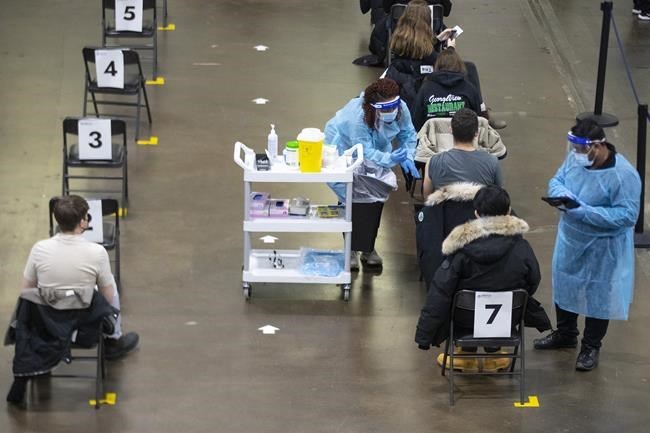More provinces have tightened public health restrictions as the Omicron variant sent Canada's COVID-19 cases soaring past the two million mark and raised fears of a post-holiday hospital spike.
The government of Canada's health website said the total case count was 2,000,976 as of Boxing Day. The website wasn't updated over the holiday period.
The new milestone was reached as several provinces recorded their highest-ever COVID-19 case numbers over the Christmas weekend.
Manitoba said Monday it was imposing new public health restrictions after the province reported eight new COVID-19 related deaths and 2,154 cases over a three-day period since Christmas Eve.
The new restrictions cap indoor and outdoor public gatherings at 50 per cent of the venue's capacity or 250 people — whichever is fewer — even for those who are fully vaccinated. They begin Tuesday at 12:01 a.m.
Premier Heather Stefanson said the restrictions will be disappointing to people as the holiday season comes to a close.
"But we must act now to protect our health-care system and ensure Manitobans can access the care they need when they need it," she said.
Health officials said about 75 per cent of all COVID-19 cases in Manitoba were now suspected to be due to the highly transmissible Omicron variant.
New Brunswick announced it would impose a 50 per cent capacity limit on restaurants, stores, bars, gyms and other establishments starting Tuesday after officials reported 639 new cases of COVID-19 over a three-day period.
Newfoundland and Labrador also smashed its previous records as it reported 357 infections in the last three days.
Prince Edward Island, which reported 156 cases over the same period, said it would no longer provide a list of exposure sites because community transmission had become so widespread.
As high as the official figures are, health care analysts have said the real number of infections is likely far higher. Several provinces have asked people to get tested only if they have symptoms as hospitals and centres have reached their testing limits.
Ontario, Quebec and Manitoba each reported thousands of additional cases Monday, prompting renewed concern over their beleaguered health-care systems' ability to handle an influx of sick patients.
Linda Silas, head of the Canadian Federation of Nurses Unions, said the "big bump" is usually seen two weeks after exposure to the virus, and expressed worries that holiday gatherings could lead to hospitals becoming overwhelmed with new cases.
"We are all bracing for that with fear, and with our fingers and toes crossed," she said in an interview Monday.
Quebec's health minister urged people to reduce contacts after the province saw hospitalizations climb by more than 140 over a four-day period. Quebec reported 8,231 cases.
Christian Dubé said on Twitter that 320 people were admitted to hospital while 179 were released between Dec. 22 and 26. He noted that admissions were rising, with 93 people entering hospital on Boxing Day alone.
Ontario reported 9,418 new cases of COVID-19, which was down slightly from the record-breaking numbers on Christmas Day.
Health Minister Christine Elliott said 480 people were in hospital because of COVID-19 and 176 in intensive care.
Nova Scotia health authorities reported an outbreak at the Halifax Infirmary site of the Queen Elizabeth II Health Sciences Centre.
They did not give details on how many patients have tested positive but said fewer than five had been "impacted." Nova Scotia recorded 581 COVID-19 cases.
Silas said the variant could exacerbate the existing nursing shortage, particularly if infected nurses are not given time to stay home and recuperate.
All Canadian families should be sent free rapid tests to help curb spread, she suggested.
Earlier Monday, Manitoba said it would make take-home, self-administered rapid tests available at provincial testing sites.
Health and Seniors Care Minister Audrey Gordon said in a statement that most symptomatic and fully vaccinated people who go to testing sites will receive a rapid test to take at home, and will only be asked to return for a lab-determined PCR test if the result is positive.
The changes will be "introduced incrementally," Gordon said.
"Making take-home, self-administered rapid tests available to symptomatic Manitobans who seek a COVID-19 test will help manage the potential demand of tests when the Omicron variant of concern becomes more prominent."
This report by The Canadian Press was first published Dec. 27, 2021.
The Canadian Press



